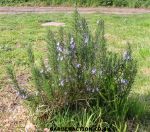Categories
Calendars
Guides
Reviews
Archive
Gallery
Articles
Ask Our Gardening Expert
![]()
WHAT TO DO IN THE GARDEN IN
Susan Explains Soil for Herbs
Daffodils
Leave the foliage alone until it dies down. The plant obtains its energy
for next year from the leaves absorbing sunshine. Don't bend them over
to encourage them to die as some gardeners do, this just restricts the
time they have to grow larger and healthier bulbs. This is one time when
"doing nothing" is better than "doing something".
Finally, sprinkle a handful or two of long lasting fertilser around each
square meter (3ft square) of soil or grass. Very lightly work it in the
soil so that it doesn't get blown away. Bonemeal or blood, fish and bone
will be excellent for a long-lasting feed.
Planting Shrubs
Every garden and gardener is suited to different shrubss but there are a
few which will thrive in almost any conditions. First is the thorny
pyracantha. These are normally evergreen but at the same time they
produce fragrant flowers in spring. They become really spectacular in
autumn when they produce red orange or yellow berries. Avoid the red
berried varieties because they tend to be eaten by birds.
Another all rounder which will grow in almost any situation is the
berberis. Like pyracantha, some varieties are evergreen, but still
produce flowers in spring and spectacular berries in autumn. Many
berberis will also have foliage that makes a brilliant display of
scarlet, blue and black in autumn.
Recommending a particular berberis variety is almost impossible because
there are nearly 500 varieties to choose from. The best plan is to
workout what you want from the plant and then take a trip to your local
nursery. Evergreen / deciduous, berries, stunning autumn leaf colour,
flowers, use for hedging or specimen plant. In our garden we have a
berberis Darwinii, discovered by Charles Darwin in Chile. It grows to
about 3m (10ft high) and produces masses of tiny yellow flowers in
spring. Later in the year it produces blue berries.
If you want something a little smaller which can be bought really
cheaply then go for berberis vulgaris. It grows to about 1.2m (4ft) high
and produces blue berries. In some parts of the UK it grows wild so you
can be assured that this plant will survive in most parts of the UK. More Information GO TO NEXT
WEEK'S "WHAT TO DO" GO TO PREVIOUS
WEEK'S "WHAT TO DO"
APRIL 1st to 7th
Many herbs are Mediterranean in origin. They thrive in
well-drained soils which receive some moisture but never get
water-logged. Pots filled with multipurpose compost is ideal if
placed in a sunny position.
If you want to plant them directly in the soil, dig in lots of
multi-purpose compost and, on heavy soils, some sharp sand.
Don't add any nutrients, sun-loving herbs don't need feeding
except on very poor soils.
It's quite possible to leave daffodils to themselves in some soils
but they will do better in all soils given just a small amount of
attention. First, when the flowers start to fade, as they do at that
time of year, then pinch off the dying flowers. This will stop the
plants putting effort into producing seeds. Instead they will put all
their efforts into producing bigger and more bulbs for next year.
Shrubs are traditionally bought and planted in autumn but if they are
pot grown (as opposed to bare-rooted) they can be sown at any time of
the year. This time of year is also a very good time to plant shrubs.
The soil is warming up and at the same time there is plenty of rain to
keep them self-watered until they become established.
For more detailed information and timings go to our individual
vegetable,
herb and
fruit pages. If you want to see a
condensed vegetable advice page with planting, sowing, care and
harvesting information for the entire year on one page then go to our
vegetable calendar.